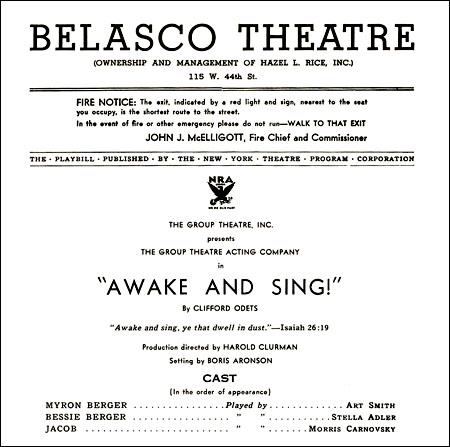 I recently posted a week’s worth of almanac entries drawn from The Collected Works of Harold Clurman, an eleven-hundred-page anthology devoted mainly but by no means exclusively to the drama criticism of a man who is better known as a director. In addition to co-founding the Group Theatre in 1931, Clurman directed the Broadway premieres of Arthur Miller’s All My Sons and After the Fall, Clifford Odets’ Awake and Sing! and Golden Boy, William Inge’s Bus Stop, Carson McCullers’ The Member of the Wedding, and Eugene O’Neill’s A Touch of the Poet. He was, in short, a first-tier theatrical professional–yet he also spent most of the second of his life doubling as a working drama critic, and his reviews, as I discovered when I read them in bulk last week, are as fresh and instructive today as they were when they were originally published in The New Republic and The Nation between 1948 and Clurman’s death in 1980.
I recently posted a week’s worth of almanac entries drawn from The Collected Works of Harold Clurman, an eleven-hundred-page anthology devoted mainly but by no means exclusively to the drama criticism of a man who is better known as a director. In addition to co-founding the Group Theatre in 1931, Clurman directed the Broadway premieres of Arthur Miller’s All My Sons and After the Fall, Clifford Odets’ Awake and Sing! and Golden Boy, William Inge’s Bus Stop, Carson McCullers’ The Member of the Wedding, and Eugene O’Neill’s A Touch of the Poet. He was, in short, a first-tier theatrical professional–yet he also spent most of the second of his life doubling as a working drama critic, and his reviews, as I discovered when I read them in bulk last week, are as fresh and instructive today as they were when they were originally published in The New Republic and The Nation between 1948 and Clurman’s death in 1980.
Needless to say, no reputable magazine or newspaper would now allow Clurman to write drama reviews while simultaneously working as a Broadway director. Is arts journalism in America better off as a result of this change in ethical standards? I very much doubt it–and thereby hangs a “Sightings” column. In Saturday’s Wall Street Journal I take a closer look at Clurman’s criticism. What made it so good? To find out, pick up a paper on Saturday and see what I have to say.
UPDATE: Read the whole thing here.
UPDATE: Yes, I know, Clurman produced Miller’s All My Sons, he didn’t direct it. Elia Kazan did, and he also staged After the Fall (Clurman was involved with the first production, but in a different capacity). My mistake–I had a fit of absentmindedness. These things happen, arrgh.
* * *
Harold Clurman talks about the state of American theater in the Seventies:
Archives for April 2009
TT: Almanac
“Good critical writing is measured by the perception and evaluation of the subject; bad critical writing by the necessity of maintaining the professional standing of the critic.”
Raymond Chandler, letter to Frederick Lewis Allen (May 7, 1948)
TT: So you want to see a show?
Here’s my list of recommended Broadway, off-Broadway, and out-of-town shows, updated weekly. In all cases, I gave these shows favorable reviews (if sometimes qualifiedly so) in The Wall Street Journal when they opened. For more information, click on the title.
Warning: Broadway shows marked with an asterisk were sold out, or nearly so, last week.
BROADWAY:
• Alfred Hitchcock’s The 39 Steps (comedy, G, suitable for bright children, reviewed here)
• August: Osage County (drama, R, adult subject matter, reviewed here)
• Avenue Q * (musical, R, adult subject matter and one show-stopping scene of puppet-on-puppet sex, reviewed here)
• Exit the King (disturbingly black comedy, PG-13, closes June 14, reviewed here)
• God of Carnage (comedy, PG-13, closes July 19, reviewed here)
• The Little Mermaid * (musical, G, entirely suitable for children, reviewed here)
• South Pacific * (musical, G/PG-13, some sexual content, brilliantly staged but unsuitable for viewers acutely allergic to preachiness, reviewed here)
OFF BROADWAY:
• Distracted (serious comedy, PG-13, closes May 17, reviewed here)
• The Fantasticks (musical, G, suitable for children capable of enjoying a love story, reviewed here)
• Love/Stories (or But You Will Get Used to It) (one-act plays, PG-13, vastly too complicated for children, closes Apr. 25, reviewed here)
• Our Town (drama, G, suitable for mature children, reviewed here)
• Ruined (drama, PG-13/R, sexual content and suggestions of extreme violence, closes May 3, reviewed here)
CLOSING SUNDAY IN WARREN, R.I.:
• The Dark at the Top of the Stairs (drama, PG-13, reviewed here)
TT: Almanac
“The drama may be called that part of theatrical art which lends itself most readily to intellectual discussion: what is left is theater.”
Robertson Davies, A Voice in the Attic
COME BACK, WILLIAM INGE
“A half-century ago, Arthur Miller and Tennessee Williams were universally reckoned the finest American dramatists of the postwar era. They still are. In 1959, however, the short list also included William Inge, and there were those who ranked Inge higher than either of his contemporaries. He was certainly more successful than Miller or Williams, both of whom already had notably uneven track records on Broadway…”
TT: Snapshot
Sir Thomas Beecham rehearsing the Royal Philharmonic in the ballet music from Gounod’s Faust in 1958:
(This is the latest in a weekly series of arts-related videos that appear in this space each Wednesday.)
TT: Almanac
“Eccentricity has always abounded when and where strength of character has abounded; and the amount of eccentricity in a society has generally been proportional to the amount of genius, mental vigour, and moral courage which it contained.”
John Stuart Mill, On Liberty
